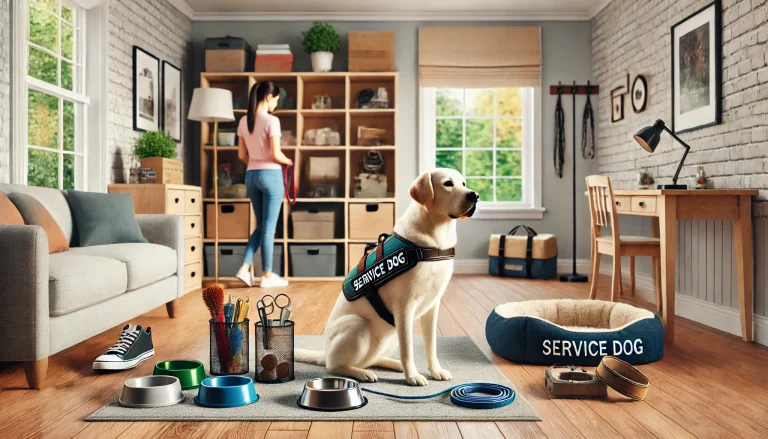Choosing to have a service dog is a life-changing decision. These dogs provide more than just physical support. They offer significant psychological benefits that improve mental well-being. In this blog post, we will explore the psychological benefits of service dogs, showing how they go beyond mere assistance. By the end, you’ll understand how these amazing animals can enhance your mental health. Let’s dive into the emotional support animals and discover their impact.

Understanding Service Dogs
What Are Service Dogs?
Service dogs are specially trained to help people with disabilities. While many people know about guide dogs for the visually impaired, service dogs can assist with a wide range of disabilities. They perform tasks that their handlers cannot do themselves, making daily life easier and safer. These tasks can include opening doors, picking up dropped items, alerting to sounds, and even helping with mobility. But beyond these practical tasks, service dogs also offer tremendous emotional and psychological support, which can be life-changing for many individuals.
Psychological Benefits of Service Dogs
The psychological benefits of service dogs are vast. These animals provide emotional support, reduce anxiety, and help manage stress. Their presence alone can have a calming effect, making it easier for individuals to cope with daily challenges. For many handlers, the mere presence of their service dog can be a source of comfort and reassurance, knowing that they have a loyal and dependable companion by their side.
Emotional Support and Companionship
Emotional Support Animals
While service dogs are trained to perform specific tasks, emotional support animals provide comfort through their presence. Both types of dogs offer emotional benefits, but service dogs have specialized training that can address specific mental health needs. Emotional support animals are typically prescribed by mental health professionals to provide companionship that helps alleviate symptoms of mental health conditions. Although they do not have the same legal rights as service dogs, their role in providing emotional stability is invaluable.
Companionship and Bonding
One of the key mental health benefits of service dogs is the companionship they offer. This bond reduces feelings of loneliness and isolation. The constant companionship of a service dog can help build a routine, providing structure and stability in their handler’s life. This daily interaction and care for another being can give handlers a sense of purpose and motivation, which is particularly beneficial for those struggling with depression and other mental health issues.
Reducing Anxiety and Stress
Calming Presence
Service dogs are trained to recognize signs of anxiety and stress in their handlers. They can intervene by providing deep pressure therapy, nudging, or leaning against their handler to offer comfort. This physical contact can help ground individuals during moments of distress. Deep pressure therapy, for instance, involves the dog applying gentle pressure to the handler’s body, which can produce a calming effect similar to a weighted blanket. This type of intervention can be particularly helpful during panic attacks or periods of high anxiety.
Preventing Panic Attacks
For those with anxiety disorders, service dogs can detect the early signs of a panic attack. They can then provide interventions, such as leading their handler to a safe place, bringing medication, or interrupting harmful behaviors. This proactive support is one of the most valuable psychological benefits of service dogs. By sensing changes in their handler’s body language or breathing patterns, these dogs can act before the anxiety escalates, helping to prevent full-blown panic attacks and making the handler feel more secure and in control.
Enhancing Social Interactions
Building Confidence
Having a service dog can boost the handler’s confidence in social situations. The dog acts as a social bridge, making it easier to engage with others. This increased interaction can reduce social anxiety and improve overall social skills. Handlers often report feeling more comfortable in public settings with their service dog by their side, knowing that they have a constant source of support. This boost in confidence can lead to more positive social experiences and a greater willingness to participate in social activities.
Breaking Social Barriers
Service dogs often attract positive attention. This can help break the ice and start conversations, making social interactions less daunting. For individuals who struggle with social anxiety, this benefit cannot be overstated. The presence of a service dog can make others more approachable and understanding, leading to more meaningful and supportive interactions. This increased social engagement can have a ripple effect, improving the handler’s overall sense of well-being and connectedness to their community.

Improving Mental Health
Routine and Responsibility
Caring for a service dog adds structure to the handler’s day. This routine can be incredibly beneficial for mental health. Feeding, grooming, and exercising the dog create a sense of purpose and responsibility, which can combat feelings of depression and aimlessness. The consistency and routine of caring for a dog provide a daily schedule that can help ground handlers, giving them a reason to get out of bed and engage with the world.
Physical Activity
Service dogs require regular exercise, which encourages their handlers to stay active. Physical activity is known to improve mood and reduce symptoms of depression and anxiety. This is another significant mental health benefit of service dogs. Regular walks and playtime with the dog not only benefit the dog’s health but also encourage the handler to spend time outdoors, getting fresh air and physical exercise. These activities can release endorphins and other chemicals in the brain that promote a sense of well-being and happiness.
Importance of Pet Insurance and Service Dog Products
Ensuring Health and Well-being
Investing in pet insurance is crucial for maintaining the health of a service dog. Regular veterinary care can be expensive, but pet insurance helps cover these costs. Keeping the service dog healthy ensures they can perform their duties effectively. Pet insurance can cover routine check-ups, vaccinations, and emergency medical care, providing peace of mind to handlers who want to ensure their dog’s long-term health and well-being.
Quality Service Dog Products
Using high-quality service dog products, such as vests and harnesses, enhances the dog’s ability to assist their handler. These products provide visibility and ensure the dog is easily identifiable as a service animal. Well-made vests and harnesses also ensure the dog is comfortable and secure while performing their tasks, which is essential for their effectiveness and the safety of both the dog and the handler.
Training Options
Professional Training
Professional training programs for service dogs are available, but they can be costly. These programs ensure the dog is well-prepared to assist their handler with specific tasks. Professional trainers have the expertise to teach complex behaviors and tasks that are essential for the dog’s role. Investing in professional training can be a worthwhile option for those who need a highly specialized and reliable service dog.
Self-Training Resources
For those who prefer to train their service dog themselves, resources are available through websites like ServiceDogOwners.com. Self-training can be a more affordable option and allows for a stronger bond between the handler and the dog. Training a service dog at home can be a rewarding experience, fostering a deep sense of trust and understanding between the dog and handler. Self-training resources provide step-by-step guidance and support, making it possible for individuals to successfully train their service dogs.
Conclusion
The psychological benefits of service dogs extend far beyond their physical assistance. These amazing animals provide emotional support, reduce anxiety and stress, enhance social interactions, and improve overall mental health. By investing in pet insurance and quality service dog products, you can ensure your service dog remains healthy and effective. Whether through professional training or self-training, these dogs become invaluable partners in managing mental health.
Discover the profound impact service dogs can have on your life. To learn more about the best psychiatric service dog breeds and how they can support your mental health, check out our detailed guide. Invest in your well-being with the companionship and support of a service dog.
Searching for a way to boost your income while keeping your service dog by your side? Learn how to launch a Side Hustle or new career and increase your earnings alongside your loyal companion. Click Here to find out more and start your journey today!






